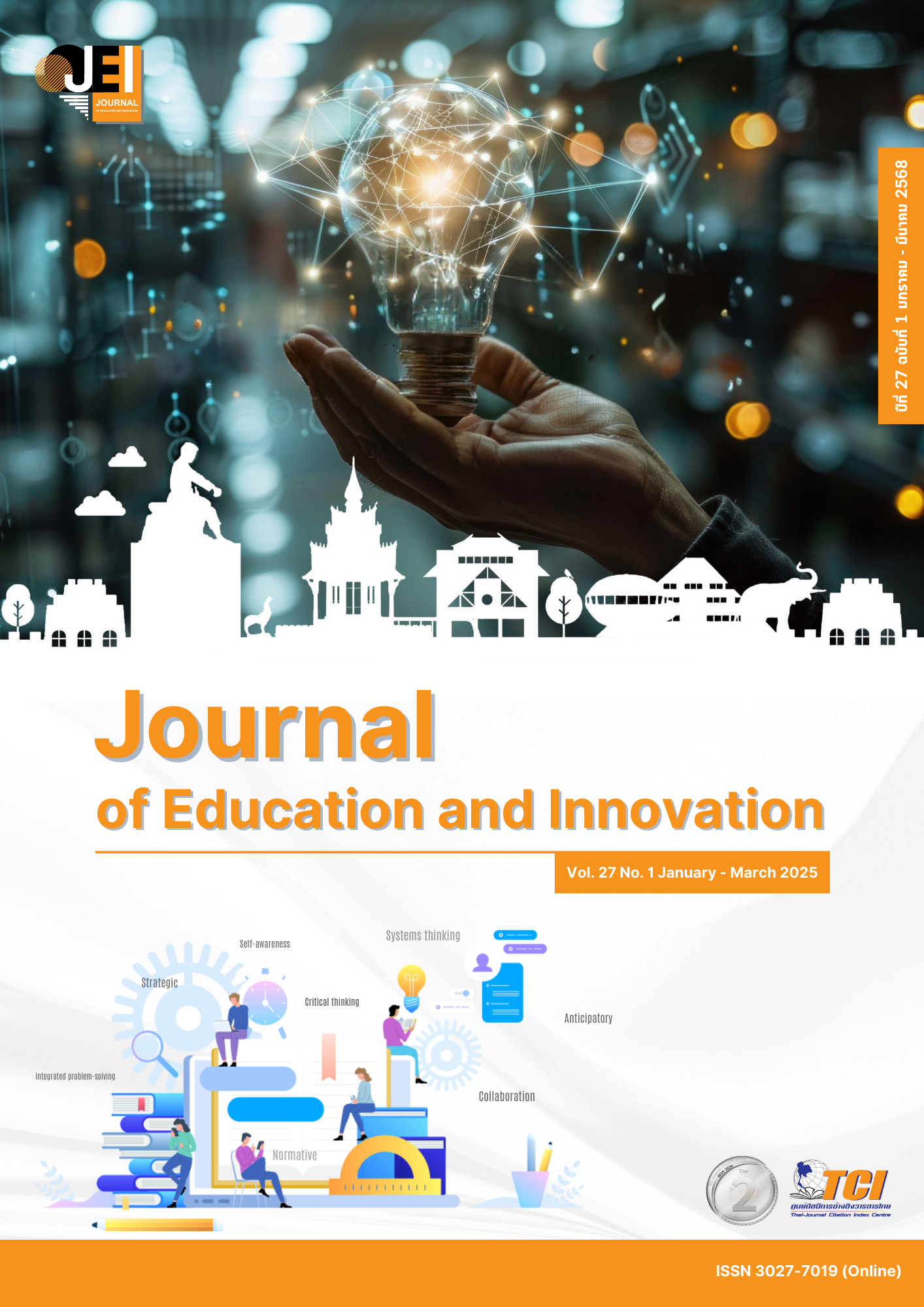การพัฒนากิจกรรมการเรียนด้วยโครงงานเป็นฐานร่วมกับเครื่องมือการเรียนรู้ดิจิทัล เพื่อส่งเสริมทักษะความเป็นผู้ประกอบการ สำหรับนักเรียนชั้นมัธยมศึกษาปีที่ 6
Main Article Content
บทคัดย่อ
การวิจัยครั้งนี้มีวัตถุประสงค์ 1) เพื่อพัฒนาและหาคุณภาพของกิจกรรมการเรียนด้วยโครงงานเป็นฐานร่วมกับเครื่องมือ การเรียนรู้ดิจิทัล เพื่อส่งเสริมทักษะความเป็นผู้ประกอบการ สำหรับนักเรียนชั้นมัธยมศึกษาปีที่ 6 2) เพื่อเปรียบเทียบความรู้ก่อนเรียนและหลังเรียนเรื่องความเป็นผู้ประกอบการ 3) เพื่อศึกษาทักษะความเป็นผู้ประกอบการ และ 4) เพื่อศึกษาความความพึงพอใจที่มีต่อการใช้กิจกรรมการเรียนด้วยโครงงานเป็นฐานร่วมกับเครื่องมือการเรียนรู้ดิจิทัล กลุ่มตัวอย่างได้แก่ นักเรียนชั้นมัธยมศึกษาปีที่ 6 โรงเรียนหนองฉางวิทยา จังหวัดอุทัยธานี จำนวนนักเรียน 36 คน ซึ่งได้มาด้วยการเลือกแบบเจาะจง เครื่องมือวิจัย ได้แก่ กิจกรรมการเรียนด้วยโครงงานเป็นฐานร่วมกับเครื่องมือการเรียนรู้ดิจิทัลเพื่อส่งเสริมทักษะ ความเป็นผู้ประกอบการ แบบทดสอบความรู้ความเป็นผู้ประกอบการก่อนเรียนและหลังเรียน แบบวัดทักษะความเป็นผู้ประกอบการ แบบสอบถามความพึงพอใจ แบบวัดชิ้นงานแบบรูบริค สถิติที่ใช้ในการวิเคราะห์ข้อมูล ได้แก่ ค่าเฉลี่ย ส่วนเบี่ยงเบนมาตรฐาน แบบทดสอบค่าที (t-test dependent) ผลการวิจัย พบว่า 1) กิจกรรมการเรียนด้วยโครงงานเป็นฐานร่วมกับเครื่องมือการเรียนรู้ดิจิทัลเพื่อส่งเสริมทักษะความเป็นผู้ประกอบการ มี 5 ขั้นตอน คือ 1) ขั้นระบุปัญหา 2) ขั้นวางแผน 3) ขั้นลงมือทำ 4) ขั้นทบทวน และ 5) ขั้นนำเสนอ และมีคุณภาพระดับมากที่สุด ( = 4.72, SD = 0.31) 2) นักเรียนชั้นมัธยมศึกษาปีที่ 6 มีความรู้เรื่องการเป็นผู้ประกอบการหลังเรียนสูงกว่าก่อนเรียน อย่างมีนัยสำคัญทางสถิติที่ระดับ .05 3) ทักษะความเป็นผู้ประกอบการในภาพรวมอยู่ในระดับดีมาก คิดเป็นร้อยละ 80.47 ถือว่าผ่านเกณฑ์ และ 4) ความพึงพอใจต่อกิจกรรมการเรียนด้วยโครงงานเป็นฐานร่วมกับเครื่องมือการเรียนรู้ดิจิทัล เพื่อส่งเสริมทักษะความเป็นผู้ประกอบการ ในภาพรวม มีความพึงพอใจอยู่ในระดับมากที่สุด (
= 4.71, S.D = 0.3)
Article Details

อนุญาตภายใต้เงื่อนไข Creative Commons Attribution-NonCommercial-NoDerivatives 4.0 International License.
เจ้าของบทความมิได้คัดลอก หรือละเมิดลิขสิทธิ์ของผู้ใด หากเกิดการละเมิดลิขสิทธิ์ ไม่ว่าวิธีใด หรือการฟ้องร้องไม่ว่ากรณีใด ๆ ที่อาจเกิดขึ้นได้ กองบรรณาธิการวารสารศึกษาศาสตร์ ไม่มีส่วนเกี่ยวข้องทั้งสิ้น ให้เป็นสิทธิ์ของเจ้าของบทความที่จะดำเนินการ
เอกสารอ้างอิง
Barrow, H. S. (2018). How to Design a Problem Based Curriculum for the Preclinical Years. New York: Springer Publishing.
Boonyasiwapong, P., & Sriphan, A. (2023). Activities to enhance entrepreneurial skills by using community business establishments for high school students in Thung Saliam District Sukhothai Province (Master thesis). Phitsanulok: Naresuan University.
Jaiwongya, R. (2017). Satisfaction with Project-Based Learning in STA423 Non-Parametric Statistics Course. In Proceedings of the 9th Rajamangala University of Technology Academic Conference: Creative RMUT and Sustainable Innovation for Thailand 4.0.
Jongchaloemchai, P., Yamrung, R., & Cheausuwantavee, C. (2021). Development of Learning Management Model for Enhancing Preservice Teachers’Creative Problem-Solving Skill. Journal of Research and Curriculum Development, 11(1), 132-142.
Kittikantakorn, K. (2020). The Development of the “Entrepreneurship” Club Activity Curriculum Based on Cognitive Apprenticeship Model for Upper Secondary School Students (Master thesis). Phitsanulok: Naresuan University.
Kongmanus, K. (2018). Digital learning tools: Ways of digital education era. Journal of Education Naresuan University, 20(4), 279-290.
KuhaRueangrong, K. (2010). A Comparison of Problem-Solving Ability and Attitudes Toward Career and Technology Education Among Grade 7 Students Between Project-Based Learning and the Learning Cycle Approach (Master thesis). Phra Nakhon Si Ayutthaya: Phra Nakhon Si Ayutthaya Rajabhat University.
Nokkeaw, P. (2019). Life and career skills in the 21st century of secondary 3 (Grade 9) students in Samutprakan province (Master thesis). Bangkok: Rajamangala University of Technology Thanyaburi.
Panich, W. (2012). The Learning Pathway for Students in the 21st Century. Bangkok: Sodsri-Saridwongsa Foundation.
Saechan, T., & Morsorn, T. (2017). Digital Literacy: Definition, Component and Current Situation. Journal of Information Science Research and Practice, 34(4), 116-145.
Sriprapai, P. (2021). Project-Based Learning to Enhance Students’ Innovation Capability (Master thesis). Bangkok: Srinakharinwirot University.
Yoelao, D., et al. (2014). A Study on PBL Implementation Derived from the Knowledge Development Project to Enhance 21st-Century Skills of Children and Youth: Lessons from Successful Thai Schools. Bangkok: Thipwisut Partnership Limited.


